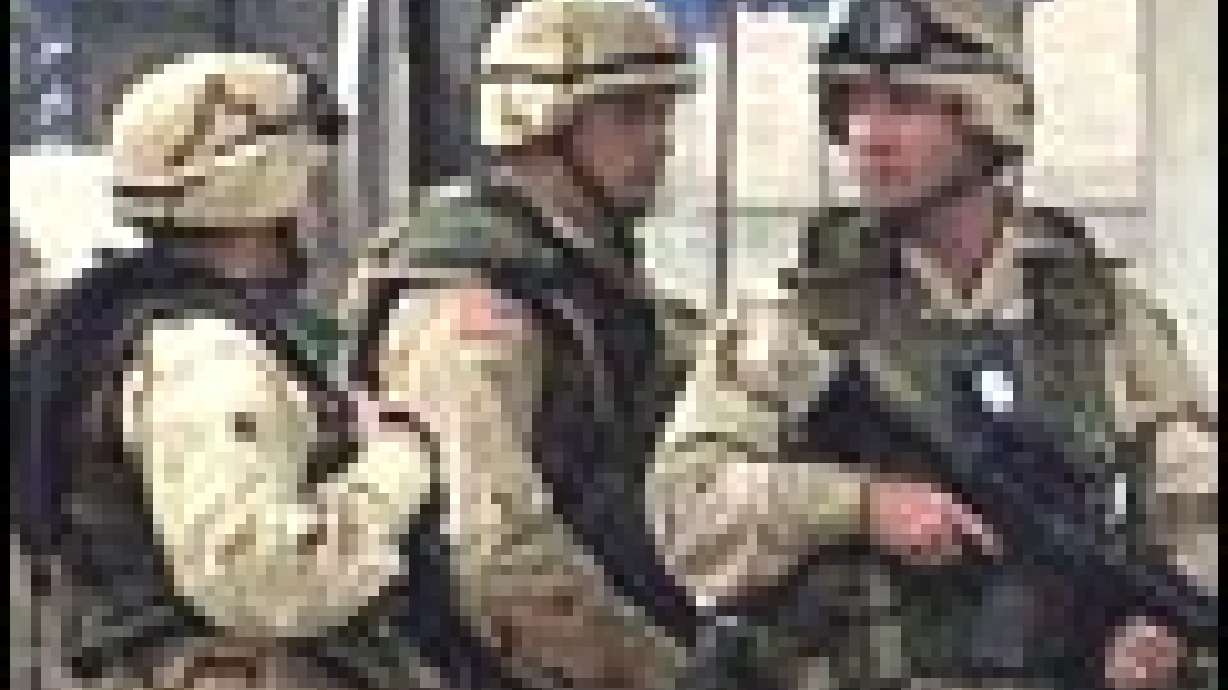Estimated read time: 4-5 minutes
This archived news story is available only for your personal, non-commercial use. Information in the story may be outdated or superseded by additional information. Reading or replaying the story in its archived form does not constitute a republication of the story.
BAGHDAD, Iraq (AP) -- U.S. forces acting on an intelligence tip raided an abandoned Baghdad community hall early Saturday and seized documents that may contain information about Iraq's suspected weapons of mass destruction.
The documents, bearing the seal of Saddam Hussein's secret service, were being handed over to senior intelligence analysts.
Some papers referred to Iraq's nuclear program.
About 50 soldiers from the 1st Armored Division stormed the building at about 1 a.m. after sealing off part of Baghdad's Azamiyah district -- a center of support for Saddam's ousted regime.
The neighborhood was where Saddam -- or someone presenting himself as the Iraqi leader -- last appeared in public before the capture of Baghdad was completed April 9.
After trying to break through the door with a sledgehammer, the troops were surprised when a squatter opened the lock from the inside and welcomed them in.
Upstairs above the hall, American troops found two large rooms stacked with cryptograph machines, secure transmission devices and binders of documents, with more papers strewn on the floor.
Soldiers examining the papers by flashlight with an Arabic interpreter found many of them marked "top secret" and "personal." They loaded dozens of boxes of paper files and some of the electronics into vehicles and took them away.
The haul came on the sixth day of Operation Desert Scorpion, a nationwide sweep for weapons and insurgents. Since Sunday, the military has conducted 90 raids and arrested 540 suspects, a coalition spokesman said on condition of anonymity. He had no figure for how many of those had already been released.
The spokesman also said U.S. officials will soon announce the creation of a new Iraqi army that will be open to soldiers of the former regime.
"It's going to be an army, not a secret police. It's going to be professional, not political ... And it will be open to former members of the Iraqi military," he said.
After Saddam's ouster, the entire Iraqi military was dismissed.
Iraqi police officials say that former soldiers may be behind some of the recent attacks on U.S. forces, and disgruntled ex-officers have been staging demonstrations demanding their salaries.
Officials said the pace of Operation Desert Scorpion raids was slackening. Still, the community hall seizure was one of six raids early Saturday by the 1st Armored Division, which also detained 22 people. The 4th Infantry Division in Kirkuk, in the north, and Taji, in the south, also conducted three raids Saturday and arrested three people.
Some of the documents seized Saturday included manifests for the delivery of communications equipment to the Iraqi nuclear agency.
One letter, dated Feb. 7, 1998, from the National Security Council of Iraq was addressed to the Iraqi Nuclear Organization, with a carbon to the Mukhabarat, the secret intelligence service.
Most of the equipment appeared to be old models, but some were still in their original boxes and apparently never used. They included equipment made by prominent U.S. and European companies like Motorola and Thompson.
"It's potentially significant," said Capt. Ryan McWilliams, the battalion intelligence officer, who examined the documents at his unit's headquarters. He said there were "potentially some pretty strong documents regarding the intelligence service."
Meanwhile, an estimated 2,000 Iraqi Shiites staged a demonstration outside the gate of the U.S. political and military headquarters in Iraq, located in Saddam's former presidential compound.
"We want an honest government, not thieves," read one banner.
"Iraq should be ruled by no one but its people," read another.
American soldiers on Wednesday shot and killed two people after a protest at the same site by former Iraqi army soldiers turned into a stone-throwing melee.
Three representatives of the protesters were allowed into the compound to present a list of demands, including the speedy creation of a representative Iraqi government and the release of war prisoners.
After the negotiators emerged, Raed al-Kazimi, a senior Shiite leader, told The Associated Press that the Americans "agreed in principle to some of the demands." But he said the Shiite leadership will take action if the Americans don't live up to their word. He did not elaborate.
In Vienna, Austria, diplomats said U.N. atomic experts have tracked down tons of uranium feared stolen from Iraq's largest nuclear research facility, much of it apparently found on or near the site.
The Tuwaitha nuclear facility, 30 miles north of Baghdad, was thought to contain hundreds of tons of natural uranium and nearly two tons of low-enriched uranium, which could be further processed for arms use. Tuwaitha was left unguarded after Iraqi troops fled the area on the eve of the war.
U.S. troops didn't secure the area until April 7. In the meantime, looters from surrounding villages stripped it of uranium storage barrels they later used to hold drinking water.
(Copyright 2003 by The Associated Press. All Rights Reserved.)









